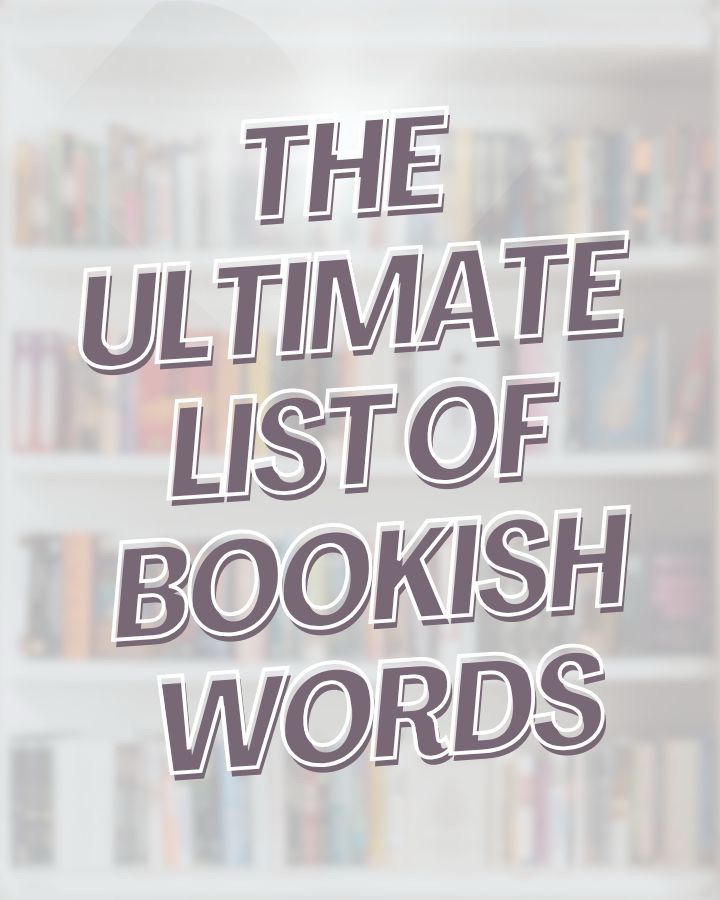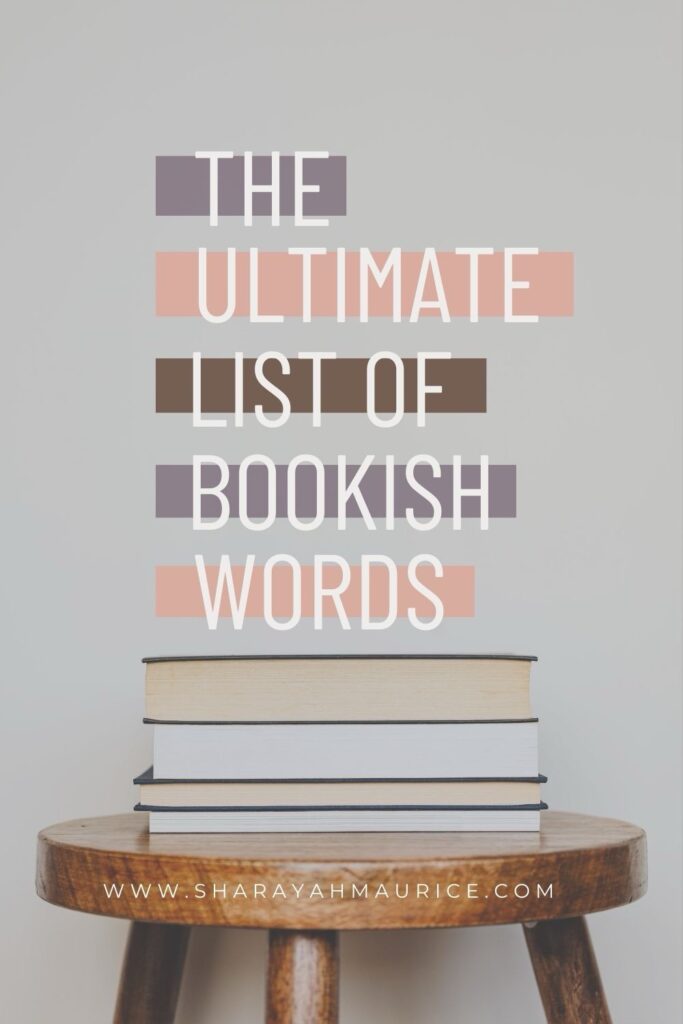Did you know the online book community has its own language? If you’re a lover of books and want the ultimate list of bookish words to use and understand in the book community, I’ve got you covered!

Whether you’re new to the online bookish world or a seasoned reader, this list of bookish words and phrases will help you navigate spaces like Bookstagram, BookTok, BookTube, book blogs (including this one!), and more. So without further ado, here are all the bookish terms you need to know.
📚 Popular Bookish Acronyms and Their Meanings
Let’s start with some of the most common bookish acronyms you’ll see floating around the online book community, from review copies to reading status updates and more.
General Book Terms
ARC (Advanced Reader Copy) — A physical or digital copy of a book given to readers before publication, usually in exchange for an honest review or promo post to stir up excitement about the release.
TBR: To-Be-Read — a list of books every reader has, and it’s always a mile long.
DNF: Did Not Finish — for those books you just couldn’t get through.
CR: Current Read — what you’re reading right now.
RTC: Review To Come — used when a reader plans to post a review later.
WIP: Work in Progress — usually refers to an author’s unfinished story.
Character and Story Terms
Next up are character and story-related bookish words — you’ll see these often in book reviews or reading discussions.
MC: Main Character
FMC: Female Main Character
MMC: Male Main Character
POV: Point of View
HEA: Happily Ever After — the perfect ending for romance lovers.
TSTL: Too Stupid To Live — used for a character who makes reckless choices despite knowing the risks.
SIMP: Refers to a character who shows excessive sympathy or affection for someone who doesn’t return it.
SMOL: A small, adorable character or creature readers can’t help but love.
Genres and Reader Categories
These bookish abbreviations help identify genres and audience levels in the book world.
YA: Young Adult (ages 13–18+)
NA: New Adult (ages 18–25+)
MG: Middle Grade (ages 8–13+)
SFF: Science Fiction Fantasy
SciFi: Science Fiction
PNR: Paranormal Romance — usually features vampires, witches, or werewolves.
HIFI: Historical Fiction
UF: Urban Fantasy
Relationship and Romance Terms
You’ll see these bookish terms often when readers talk about character dynamics or romance subgenres.
MF: Male/Female relationship
MM: Male/Male relationship
FF: Female/Female relationship
RH: Reverse Harem — one female character in a relationship with multiple males.
OTP: One True Pairing — your favorite fictional couple that you want to end up together.
NOTP: Not One True Pairing — a couple you don’t ship or support.
Book Community & Reading Platforms
The online reading world has its own set of bookish platform abbreviations that help readers connect.
AO3 (Archive of Our Own) — A fan-fiction website where readers share their stories.
KU: Kindle Unlimited — Amazon’s subscription service for unlimited reading.
BOTM: Book of the Month — a popular book subscription box.
GR: Goodreads — the ultimate online hub for book lovers.
B&N: Barnes & Noble bookstore
BAM: Books-A-Million bookstore
HP: Harry Potter — often used shorthand in fandom discussions.
Diversity and Reader Sensitivity Terms
These bookish words show up often in content notes, reviews, and discussions around representation.
TW & CW: Trigger Warnings and Content Warnings that help readers avoid sensitive topics.
POC: People of Color
BIPOC: Black, Indigenous, and People of Color
Fun and Aesthetic Reader Terms
Finally, here are some fun bookish abbreviations you might see when readers talk about aesthetics or reading vibes.
SE: Sprayed Edges — colored edges on the pages of a book.
TBB: To Be Bought — books you plan to purchase soon.
HOA HOA HOA: The opening of Eyes on Fire by Blue Foundation, used to describe that gloomy, cozy fall atmosphere reminiscent of Twilight season.
Common Bookish Terms Every Reader Should Know
- Mood Reader: a reader who chooses their books based on their current mood
- Reading Slump: not feeling like reading any books and is basically the worst feeling ever
- Buddy Read: reading a book with a book bestie
- Book Hangover: reading such an amazing book that you can’t stop thinking about it after you’ve finished and are unable to start another book because you are mentally still in the last one
- Shelfie: a photo of your book shelf
- Book Mail: books that you ordered or received as gifts in the mail
- Fandom: a large group of people who all love the same book (i.e. Harry Potter fandom)
- Book Stack: a photo of a stack of books
- Cliffhanger: the ending of a book in which the scene ends at a crucial point where anything could happen and consequently leaving you hanging off a precarious cliff
- Trope: a recurring theme, scene or dialogue found in book genres. (i.e. he says, “who did this to you?” or, there’s only one room at the inn for the MC’s. Bonus if they hate each other!)
- Book Nook: a small, cozy space for readers to cuddle up and read
- Ship: the relationship between two main characters you are cheering for
Bookish Types
- Book dragon: a reader who hoards books like a dragon hoards gold
- Book bee: a reader who bounces between multiple books at a time
- Book penguin: a reader who re-reads the same series over and over again
- Book fox: a reader who sneaks reading time in whenever and wherever they can
- Book owl: a reader who stays up all night reading “just one more chapter”
- Book cat: a reader always giving books as gifts
- Book cheetah: a reader who speed reads all their books
- Book worm: the classic book loving person
That’s a lot of bookish words and phrases! Now you have a go-to reference whenever you come across a new bookish term or acronym you don’t recognize. Yay!
Looking for your next clean fantasy romance? Browse my Clean Fantasy Romance Library — a curated collection of magical, no-spice reads you’ll fall in love with. 💫 You might also like my post on How to Support Indie Authors — another favorite topic in the bookish world!
If you loved this post, be sure to Pin it so you can find it anytime 📌
Pin It


Leave a Reply